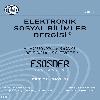Preschool Child-Centered Learning and Music Strategies
Preschool Child-Centered Learning and Music Strategies
In the researches carried out regarding pre-school music education, it has been found that “child-based” lessons positively affect the musical creativity and musical perceptions of children. In this research, under the main title of child-based learning in pre-school music education, subjects such as child-based applications in music education, differences between teacher-based and child-based music lessons and problem solving strategies have been focused on.The purpose of the study carried out in this direction is to give first information supported with foreign resources on pre-school “child-based” learning and to propose various methods for forming the musical developments of their students. At the end of the study, it was defended that by giving children freedom and creative places in their pre-school music education can provide positive development in fundamental music education program. And adding music lessons in four years Pre-school Teacher Education programs was also suggested.
___
- Açıkgöz, K. Ü. (2003). Aktif öğrenme, İzmir: Eğitim Dünyası Yayınları.
- Anonymous, (1994 a). The School Music Program, A New Vision (Reston, VA: MENC.)
- Anonymous, (1994b). Music Educators National Conference. Opportunity-to-learn standards for music instruction: Grades PreK-12. Reston, VA: MENC
- Anonymous, (1996). Top 10 signs of a good kindergarten classroom, NAEYC, Retrieved, May 6, 2002, from http://www.naeyc.org/resources/eyly/1996/12.htm
- Anonymous, (1997). National Association for the Education of Young Children (NAEYC), Licensing and public regulation of early childhood programs, Retrieved 01/10/2004 from http://www.naeyc.org/resources/position%5fst atements/ pslicense.htm
- Bennett, N., Wood, L ve Rogers, S. (1997). Teaching through Play: Teachers’ Thinking and Classroom Practice, Buckingham, England: Open University Press.
- Bırkenshaw ve Fleming, L. “Music For Young Children: Teaching For The Fullest Development of Every Child”, Early Childhood Connections, 1:6–13, Year: 1997
- Bilgin, İ., Uzuntiryaki ve E., Geban, Ö. (2002). “Kimya öğretmenlerinin öğretim yaklaşımlarının Lise 1 ve 2.sınıf öğrencilerinin kimya dersi başarı ve tutumlarına etkisinin incelenmesi”, V. Ulusal Fen Bilimleri ve Matematik Eğitimi Kongresi, 16-18 Eylül: Ankara
- Bredekamp, S. (Ed.). (1987). Developmentally appropriate practice in early childhood programs serving children from birth through age 8. Washington, DC: National Association for the Education of Young Children.
- Bredenkamp, S. ve Copple, C. (1997). eds., Developmentally Appropriate Practice in Early Childhood Programs, Washington, DC: National Association for the Education of Young Children.
- Decarbo, J., ve Nelson, J. (2002). Music and early childhood education. In R. Colwell & C. Richardson (Eds.), The new handbook of research on music teaching and learning (pp. 210-242). New York: Oxford University Press.
- Fisher, J. (1996). Starting from the Child? Teaching and Learning from 4 to 8, Buckingham/ England: Open University Press.
- Gordon, E. A. (1997) Music Learning Theory for Newborn and Young Children. 2nd ed, GIA Publications, Chicago.
- Gürgen, E. (2006). “Müzik eğitiminde yaratıcılığı geliştiren yöntem ve yaklaşımlar”, İnönü Eğitim Fakültesi Dergisi, Cilt, 7; Sayı:12, (81-93).
- Katz, L. (1988). Early childhood education: What research tells us. Bloomington, IN: Phi Beta Kappa Educational Foundation.
- McGraw, G, “Singing in Early Childhood: A Re-Examination of Appropriate Practice”, Early Childhood Connections, 4: 25–35, Year: 2002.
- Senemoğlu, N, “Okulöncesi Eğitim Programı Hangi Yeterlikleri Kazandırmalıdır”, H.Ü. Eğitim Fakültesi Dergisi, Sayı: 10, ss. 21-30, Yıl:1994.
- Shulman, L. (1990). Aristotle had it right: On knowledge and pedagogy. (occasional paper No: 4). East Lansing, Mic: The Holmes Group.
- Sims, W. L. (1995). Strategies for teaching prekindergarten music. Reston, VA: Music Educators National Conference.
- Tobin, K., Tippins, D.J., ve Gallard, A. (1994). Research on instructional strategies for teaching science. New York: Macillan.
- Turner, Mark E, “Child-centered learning and music programs”, Music Educators Journal, 00274321, Jul99, Vol. 86, Issue 1, Year: 1997.
- Ünsal, H. (2002). “Web destekli eğitim, elektronik öğrenme ve web destekli öğretim programlarındaki çeşitli ders modelleri”, Yakın Doğu Üniversitesi XI. Eğitim Bilimleri Kongresi, 23-26 Ekim, Kıbrıs.
- Vygotsky. L.S. (1986). Thought and Language. Cambridge. MA. MİT Press: 55-86.
- Yayın Aralığı: Yılda 4 Sayı
- Yayıncı: Cahit AYDEMİR
Sayıdaki Diğer Makaleler
Başlıca Sosyo Ekonomik Sorunlar Suçun Belirleyicisi Olabilir mi?Türkiye'de İller Arası Bir Analiz
Seyit KÖSE, Serap DURUSOY, Oğuz KARADENİZ
Preschool Child-Centered Learning and Music Strategies
Sınıf Yönetimi Açısından Öğretmen Niteliklerinin Belirlenmesi
İbrahim ÇANKAYA, Etem YEŞİLYURT
Farklı Algılanan Değer Perspektifine Sahip Kişilerin Ayırt Edici Özelliklerinin İncelenmesi
Nilgün SARIKAYA, Nihal SÜTÜTEMİZ, F. Anıl KONUK
Osmanlı'da Adalet Sistemi ve Latifi Tezkiresinde Şair Nihani'nin Osmanlı Kadılarına Eleştirileri
What is the Role of the Evaluators to Improve Society (Donald Campbell’s Experimenting Society)
Dicle Üniversitesi Öğrencilerinin Türkiye'nin Avrupa Birliği Üyeliğine İlişkin Görüş ve Beklentileri
